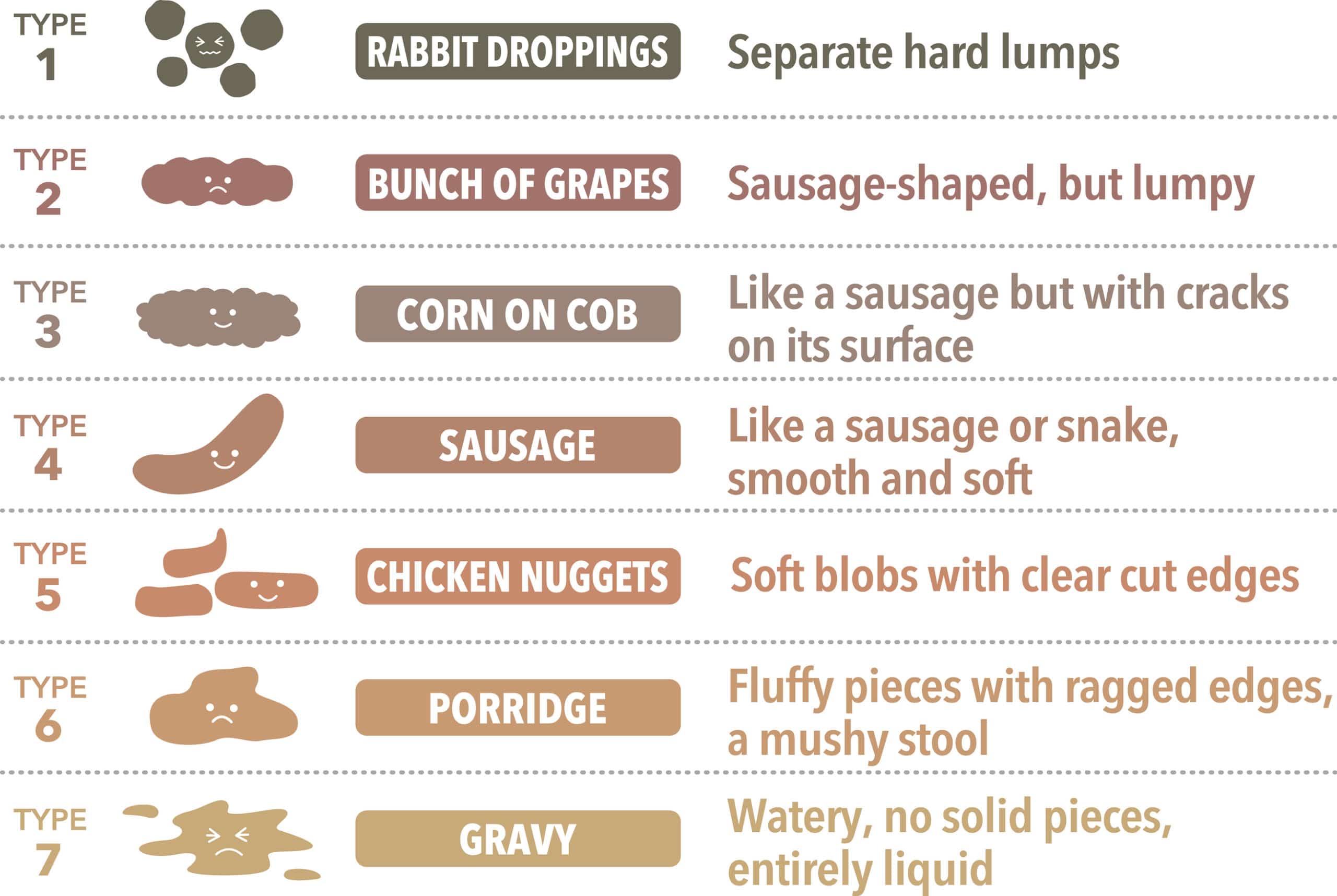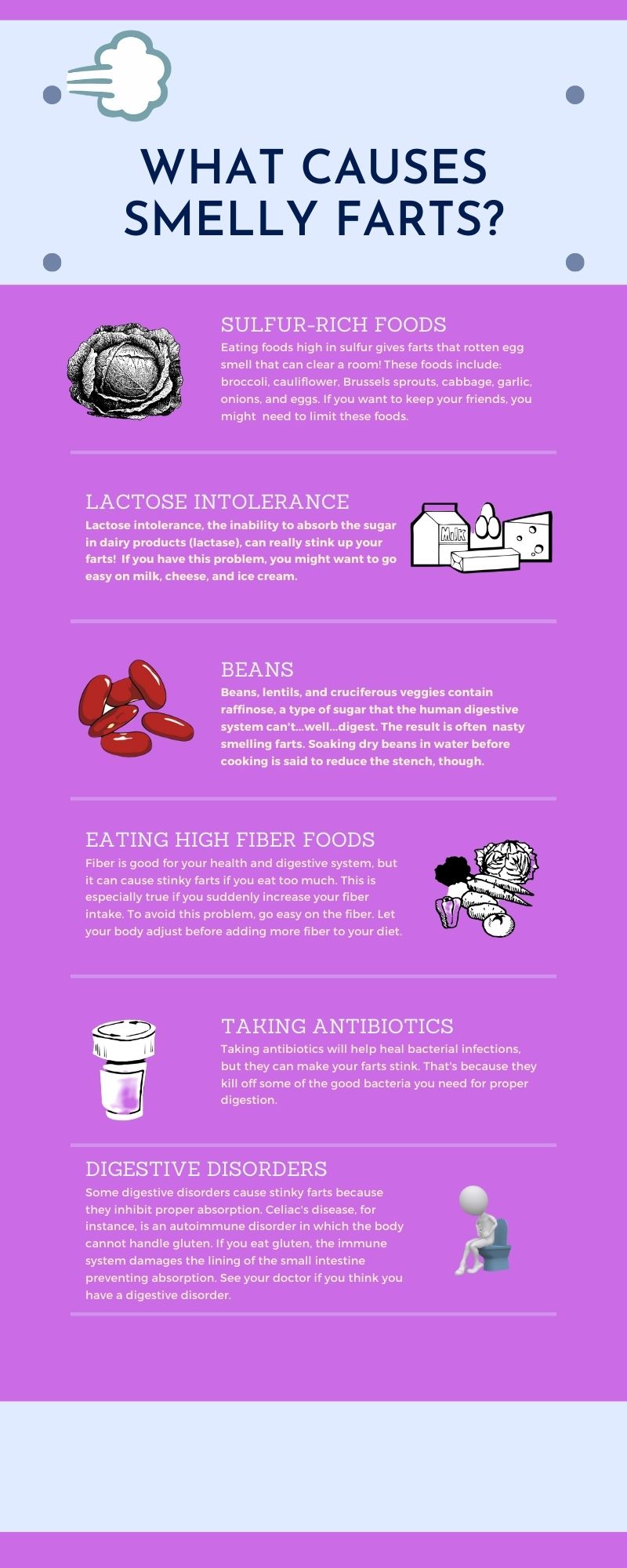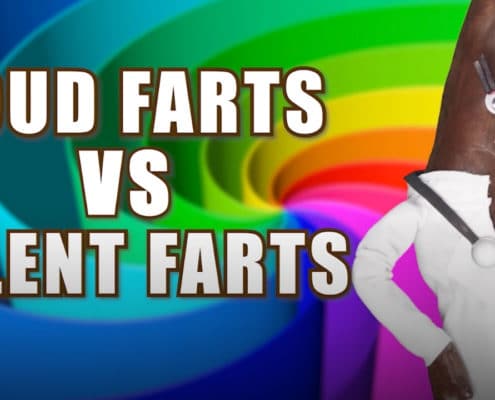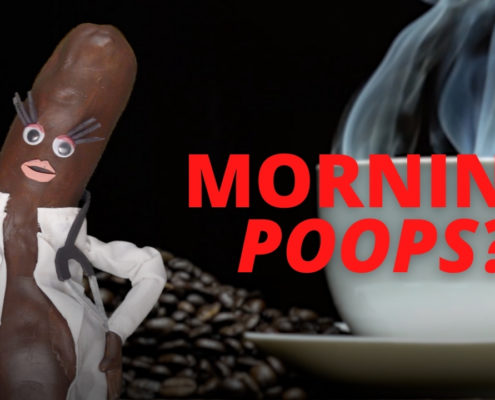Click Here For Transcript of "Why Do Farts Smell?" Video
Oh gross!
Where did that smell come from? It’s a miracle of science, but boy can it be stinky.
Poo Doctor here to give you the facts about smelly farts.
Your gut is constantly working to break down the food you eat and depending on what you put down there you might get some nasty stink. This can be caused by byproducts like ammonia or hydrogen sulfide.
And just because your farts smell doesn’t mean you’re eating the wrong thing, but it could definitely mean that your digestive system needs some help.
And to do this, I recommend one “stinky” nutrient as the best way I’ve found to fix your farts and supercharge your gut.
Click below and get a fart head start.
And remember, like for good poop, share for great poop.
Demystifying the Smelly World of Flatulence: Exploring Different Fart Odors and Dispelling Myths
Farting is a natural bodily function that often leaves us pondering the mysteries of its unpleasant odor. From the notorious smell of rotten eggs to the curiosity surrounding flammability, there are various aspects to explore when it comes to understanding why our farts can smell so bad.
In this section, we will delve into the science behind different fart smells, address common misconceptions about poop particles in farts, and shed light on the intriguing topic of flammable gases. So, let’s embark on this olfactory adventure and demystify the world of flatulence!
Different Fart Smells:
One of the most intriguing aspects of farts is the range of odors they can produce. Have you ever wondered why some farts smell like rotten eggs? The answer lies in the presence of certain gases, such as hydrogen sulfide.
When foods rich in sulfur compounds, like eggs, broccoli, or cabbage, are broken down in the digestive system, they release hydrogen sulfide gas, which gives farts that unmistakable rotten egg smell. Similarly, other food components can contribute to different smells, resulting in a diverse array of fart odors.
Dispelling the Myth:
Poop Particles in Farts: A common misconception is whether farts contain poop particles. While it is true that both farts and feces originate from the digestive system, the two are distinct entities.
Farts primarily consist of gases produced during digestion, such as carbon dioxide, methane, and nitrogen. Poop particles, on the other hand, are solid waste materials. When you pass gas, any potential fecal particles are highly unlikely to accompany the gaseous release. So rest assured, your farts are generally free from poop particles.
Flammability of Farts:
The notion of flammable farts and the spectacle of fart lighting have garnered attention in popular culture. However, it is important to approach this topic with caution.
While certain gases present in farts, such as methane, are flammable, attempting to ignite a fart can be extremely dangerous and should never be attempted. The risk of injury, including burns, is high, and there have been documented cases of accidents resulting from such endeavors. It is best to prioritize safety and enjoy the humor of fart-related jokes without engaging in risky activities.
Understanding Flammable Gases:
Farts can contain flammable gases, but it’s crucial to recognize that the concentration of these gases is generally low. Methane, one of the main flammable gases found in farts, is also a component of natural gas.
Although methane is flammable, the amounts present in a fart are typically insufficient to be ignited. Furthermore, carbon dioxide and nitrogen, which are non-flammable gases, are also part of the gas composition in farts. So, while flammable gases can be present, the risk of combustion is negligible.
Conclusion:
The world of flatulence is indeed fascinating, with different fart smells and lingering myths. Understanding the science behind these odorous releases helps demystify the topic and dispel common misconceptions. While farts can emit unpleasant smells, attributing them to the presence of poop particles is inaccurate.
Moreover, while certain gases in farts are flammable, engaging in activities like fart lighting is highly unsafe. Remember, the enjoyment of humor and curiosity surrounding farts can be harmless, but it’s crucial to prioritize safety and separate fact from fiction. So, embrace the peculiarities of flatulence with a smile, but always keep safety in mind!
Ever wondered why, in the grand orchestra of bodily functions, farts often take the solo with a rather unpleasant aroma? It’s a natural question that piques our curiosity and, let’s face it, sometimes our humor. This unspoken query lingers in the air, much like its subject matter, challenging the norms of polite conversation. Yet, understanding the whys can unlock a treasure trove of insights into our health and well-being.
At its core, this question isn’t just about social embarrassment or a punchline to a joke. It’s a gateway to a deeper understanding of our digestive system, the foods that fuel it, and the complex symphony of microbes that call our guts home. These silent but deadly occurrences of passing gas are not just a natural part of digestion; they’re a sign from our bodies, a signal that sometimes all is not as harmonious as it could be within.
Without venturing too far into the technical weeds, let’s embark on a journey to demystify this phenomenon of why farts smell so bad. Exploring this topic might not just change how we think about this natural bodily function; it could also illuminate paths to optimizing our health, guiding us toward a balance that resonates well beyond our digestive tracts. So, let’s approach this with an open mind and perhaps a pinch of humor as we explore one of nature’s more malodorous mysteries.
7 Lifestyle Causes of Smelly Farts
Understanding the root causes of the intestinal gas that produces smelly farts can sometimes feel like navigating a labyrinth without a map. While diet and physical activity are often highlighted, there’s a broader lifestyle canvas that paints a more comprehensive picture of this natural phenomenon.
1. Hydration Habits
Water is the essence of life and plays a pivotal role in the digestive process. Inadequate hydration can lead to a concentration of gases in the intestines, which can produce smelly gas. Imagine the body’s water supply as a river that carries waste and gas smoothly along the digestive tract. Without enough water, this river slows to a trickle, allowing gases to accumulate and concentrate, leading to stronger odors that often smell like rotten eggs when they finally escape. Increasing water intake can help dilute these gases, making for a less noticeable exit.
2. Sedentary Lifestyle
A sedentary lifestyle can lead to slower digestion and increased gas buildup. When we sit for prolonged periods, our body’s natural ability to move food and gas through the digestive system is hampered. This can be likened to a stagnant pond, where lack of movement allows for the accumulation of materials, in this case, gas, which can lead to more stinky farts. Introducing gentle movements throughout the day can stimulate digestion and help gases pass more freely.
For individuals managing weight-related health concerns, a sedentary lifestyle may exacerbate digestive irregularities. In some cases, healthcare providers may recommend weight loss drugs for certain individuals as part of a comprehensive plan to improve overall metabolism and digestive health, potentially reducing the frequency or intensity of gas buildup.
3. Medications and Supplements
Certain medications and supplements can inadvertently cause smelly farts. For instance, antibiotics can disrupt the gut microbiome, leading to an imbalance in bacteria that can ferment gases more potently. Similarly, supplements like iron can slow down the digestive process, leading to gas buildup. It’s a delicate balance, where even substances meant to aid our health can tip the scales towards more odorous emissions.
4. Stress Levels
Stress has a profound impact on our digestive system. When stressed, the body diverts blood from the digestive system, slowing the digestive process and leading to gas buildup. This stress-induced slowdown is akin to a traffic jam, where everything comes to a standstill, allowing gases to accumulate and become more concentrated.
5. Sleep Patterns
Poor sleep can disrupt the body’s natural rhythms, including those of the digestive system. A lack of restful sleep can slow digestion, leading to a similar effect as a sedentary lifestyle, where gases have more time to accumulate and develop a stronger odor. Ensuring regular, quality sleep can help maintain the digestive system’s timing and reduce the occurrence of smelly farts.
6. Clothing Choices
Tight clothing can physically restrict the movement of gases through the intestines, leading to buildup and more potent farts. Looser clothing allows for natural movement and can help gases pass more discreetly and less offensively.
7. Chewing Gum
Chewing gum can lead to swallowing air, which must eventually exit the body. While not directly related to the odor of farts, more swallowed air can increase the volume of gas needing to be expelled, sometimes leading to more opportunities for smelly releases. Reducing gum chewing can decrease the amount of air swallowed and, consequently, the frequency and volume of gas released.
Navigating the complexities of what makes farts smelly reveals a tapestry of lifestyle factors interwoven with our bodily functions. While often overlooked, these elements offer avenues for modification and improvement, highlighting the interconnectedness of our choices and bodily expressions. Understanding and adjusting these lifestyle aspects can lead to not just less smelly farts but also a more harmonious and comfortable bodily experience.
5 Dietary Causes of Smelly Farts
Navigating through the maze of dietary choices, certain foods stand out for their notorious role in contributing to the more fragrant episodes of our bodily functions. Here, we explore a selection of foods known for their potential to lead to smelly farts, not to demonize them, but to better understand their effects on our digestive symphony.
1. Cruciferous Vegetables
Broccoli, cauliflower, and cabbage are celebrated for their nutritional prowess, packed with fiber and essential nutrients. (High-fiber foods, in general, can lead to smelly flatulence due to the release of carbon dioxide and other gases when gut bacteria break down the fiber.) In addition, their high sulfur content can produce gas with a stronger odor when broken down in the gut. This doesn’t mean we should avoid these healthful greens; moderating intake or gradually increasing it can help our digestive system adjust.
2. Legumes
Beans and lentils are fantastic sources of protein and fiber but are also well-known for their gas-inducing, bad-smelling flatulence properties. This is due to their high amounts of fiber and raffinose, a complex sugar that produces gas when fermented by gut bacteria. Soaking beans before cooking and increasing water intake can help mitigate some of the gaseous side effects.
3. Dairy Products
For those with lactose intolerance, a food intolerance that occurs when you consume dairy products like milk, cheese, and ice cream can lead to uncomfortable digestive symptoms, including smelly farts. This happens because the body lacks enough of the enzyme lactase to break down lactose, leading to fermentation in the gut. Opting for lactose-free alternatives or enzyme supplements can offer relief.
4. High-Fat Foods
Fatty foods, particularly those rich in saturated fats, can slow digestion, allowing food to ferment longer in the gut. This prolonged digestion can lead to more odorous gas production. Balancing meals with fiber-rich vegetables and whole foods can help improve digestion and reduce the impact on our olfactory senses.
High-fat diets are not only linked to slower digestion but may also contribute to other weight-related health issues. Weight loss drugs, under medical supervision, might be considered for certain individuals looking to address the underlying causes of excessive gas production and improve overall dietary balance.
5. Artificial Sweeteners
Found in sugar-free gum, candies, and some processed foods, artificial sweeteners like sorbitol and xylitol can cause digestive distress and smelly gas in some individuals. These sugar alcohols are not fully absorbed by the body and, when fermented by gut bacteria, can produce gas. Moderating the intake of foods containing these sweeteners can help keep the air clear.
Understanding how these foods interact with our unique digestive systems allows us to make informed choices, balancing our dietary desires with the quest for a healthy digestive system. While these foods may challenge our social comfort zones, they also offer nutritional benefits that can be harnessed with mindful eating practices.
Recognizing When to Consult a Doctor
In the landscape of our well-being, occasional smelly farts are natural. However, if you notice a persistent change in frequency or odor, or if it’s accompanied by other symptoms like abdominal pain, significant bloating, or changes in stool, it’s a signal to seek medical advice. This proactive step can ensure that your digestive health remains a source of nourishment rather than discomfort, illuminating any underlying conditions requiring attention.
For certain individuals experiencing persistent digestive symptoms alongside weight-related challenges, discussing options like weight loss drugs with a healthcare provider may offer additional pathways to improve gut health and manage symptoms effectively.
Preventing Smelly Farts: Lifestyle Adjustments
Embarking on a journey to reduce smelly farts doesn’t just elevate our comfort; it’s a stride towards understanding and harmonizing with our body’s natural processes. Here are several preventative tips, each shedding light on simple yet effective adjustments we can make:
- Stay Hydrated: Enhance the smooth passage of waste and reduce gas concentration by maintaining adequate hydration throughout the day.
- Mindful eating: Eating slowly and mindfully can reduce the amount of air swallowed during meals, minimizing excessive gas buildup.
- Limit intake of foods known to cause foul-smelling gas. Please see the foods listed above.
- Balance your microbiome: Incorporating probiotics into your diet can support a healthy gut flora balance, aiding in less odorous gas production.
- Opt for comfortable clothing: Loose-fitting attire allows for natural movement and digestion, preventing unnecessary gas retention.
- Manage stress: Engaging in relaxation techniques can improve digestive function and reduce stress-related gas buildup.
- Establish regular sleep patterns. Prioritizing consistent, quality sleep supports overall digestive health, reducing the likelihood of smelly farts.
- Limit air swallowing: Avoid excessive gum chewing and carbonated beverages to decrease the amount of swallowed air. Integrating these preventative measures into our daily routine can foster a more comfortable and less odorous existence. These tips are not just about avoiding discomfort; they’re about embracing a lifestyle that resonates with our body’s needs, ensuring that every step we take is in harmony with our well-being.
Embracing Wellness: A Journey Together
As we navigate the nuances of reducing smelly farts, we embark on a broader journey toward understanding and harmony with our bodies. This exploration isn’t just a solitary quest; it’s a shared voyage that enriches our collective well-being. By adopting simple lifestyle adjustments, we foster an environment where comfort and health coalesce, enhancing our daily lives.
Let’s not keep these insights to ourselves. Share this knowledge with friends and family across all social media platforms and email. Together, we can turn these tips into a ripple effect of wellness, spreading far and wide and inviting others to join us on this path of discovery and mutual support.
Types of poop one encounters is categorized by the Bristol Stool Chart. This chart is a generalized indicator of how or why different types of poops look and feel a certain way. The 7 types of poop are broken up into categories based on a 2,000-person study!

Does your poo look this good? If you have Bristol Type 3 or 4 – your poop is considered “normal”! Bristol Type 1 or 2, is where the poop is hard and difficult to pass, are indicative of constipation. Often, these types of stool can be painful to pass – but don’t worry – Doctor Poo has a recommended healthy-gut switch solution…just keep reading!
Should you ever worry about your poop?
Always consult your healthcare provider if you have any concerns about what your poop means. People are asked to call their health care providers if: They experience severe levels of abdominal pain or discomfort with diarrhea that does not go away when you poop or fart. Also, if diarrhea is accompanied by fever of 101 degrees Fahrenheit or higher, chills, vomiting, or fainting, call your physician immediately.
What is an unhealthy poop?
An unhealthy poop is when one poops too often (hence, your doctor asking you if you poop more than three times daily) or not pooping often enough (As such, less than three times a week) and also excessive straining when pooping. Poop that is colored red, black, green, yellow, or white. greasy, or fatty stools is unhealthy.
Help fix so many of your digestive and bathroom issues, such as gas and bloating and improve your overall health with this patented molecule that is backed by Harvard Doctor’s by clicking here!
Doctor Poo Provides More Valuable Answers for Those Hard to Ask Questions Below:













